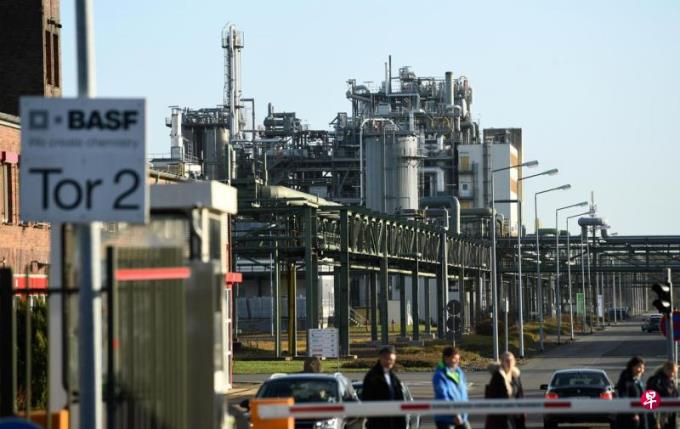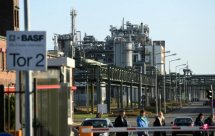
Following the 11 factories in Ludwigki in May this year, Basf, Germany's largest chemical company, closed two local manufacturers in August, and stopped all the production lines of three factories next year.Coincidentally, Volkswagen Group, Germany, Volkswagen Group recently announced that considering closing two German factories and creating the historical records of the first local factory since the founding of Volkswagen Group.
While closing the local factories or production lines, German companies have also taken the pace of investment and business gravity.As early as two years ago, BASF publicly announced that he would not continue to invest in Germany, and then quickly opened the move to move out of the production base, including an investment of more than 43%of a scale of 26 billion euros.Engineering companies have invested 10 billion euros in Zhanjiang, Guangdong to build BASF's third largest integrated production base in the world.
BASF's vibration arms quickly attracted their peers to follow, and the German chemical leader successively made a decision to reduce, postpone or stop investing in local investment.Bayer and Yingchuang Group have given real response to the establishment of a technological innovation center in Boston and Pennsylvania in Boston and Pennsylvania.In addition to the chemical industry, Hansha Airlines and Siemens have also made arrangements for expanding production and capital increase in the United States; Volkswagen Group and BMW have added new factories in the United States.It also announced that the focus of investment was transferred overseas.
Several groups of authoritative data can more comprehensively show the basic appearance of German companies to reduce domestic investment and increase overseas investment.The latest survey of the German Automobile Industry Association's intention to supply its components and vehicle modification companies shows that only 1%of companies indicate that they will continue to invest in Germany.The sampling survey report of the German Industry and Commerce Conference also shows that 17%of domestic automobile companies plan to relocate some production to foreign countries, and more than a quarter is considering transferring part of production abroad.
For the investment and production of "going to Germany", BASF Board Chairman Bo Mule bluntly pointed out that there is no place to make money in Germany.Data show that following the year -on -year decrease of 21%, BASF's global sales in the first half of this year fell by 9.7%again, and the profit has shrunk by 12.8%.Of course, sales and profit damage are not only the BASF family. In the first half of this year, the sales of German chemical industries fell by 1%, and the annual decrease will reach 3%. At present, 40%of the company's profits have fallen sharply. 15%of the companies are losing losses at losses.state.
Of course, multinational companies cannot attribute all the risk of performance or profits to the local area.It doesn't make sense, and it is far from German chemical companies that fall into the operating difficulties.A survey report issued by PricewaterhouseCoopers in Germany pointed out that compared with last year, the sales revenue of German companies this year will reduce average by 5.1%, the lowest in the past three years.
After the Russian and Ukraine War, the pain of energy prices that specially relying on imported Energy's German companies is particularly severe. Although the German government is also accelerating the clearing of fossil energy, and at the same time, the transformation of the use of clean energy is accelerated, even if it is this year, it is this year.The proportion of new energy power generation is expected to rise to 65%, but the cost is still as high as 40%of the top 40%of the Russian and Ukraine War.Digitals of the German Federal Statistics Bureau show that nearly half of (47%) investigated companies believe that production costs will be further increased this year, and rising upstream energy costs are the main reasons for "voting" in German companies.
Throughout the comprehensive review, the reasons that can stay in Germany in Germany are indeed insufficient.The comprehensive tax burden in Germany is currently nearly 30%, second only to Japan in developed countries; in the Economic Organization State, it takes less than two months to obtain a business license, and Germany will take four months.In addition to bureaucracy, the German labor market environment makes it difficult for enterprises to support it.At present, the elderly over 60 years old account for 23%, the fertility rate is only 1.4, the natural growth rate is 0.04%, and the continuous supply of labor is insufficient.What's more terrible is that although the current average annual working hours in Germany are only 1343 hours, the shortest country is the shortcomings of the OECD, the labor market mainly driven by sellers has driven German enterprise employees.The company can only buffer contradictions through salary increases, and therefore feels that they are always suffering.
The increasingly fierce external market competitive environment is also an important factor in exacerbating German -enterprise relocation.The United States' reduction of inflation provides huge subsidies and tax credits for investment in African enterprises, leading to German chemical and automotive companies.What makes German machinery companies not expect is that the US company, who used to be the best customer, has now become its strongest competitors. Not only the low -end products are folding in the United States market, but no one is involved in high -end products. German industrial machinery andEquipment has a share in the United States to the lowest value in 30 years.On the other hand, in the game with China and American electric vehicle companies, German companies were thrown out of several streets due to lack of technical reserves and lagging rhythm.In the context of the acceleration of global protectionism and unilateralism, the German government also shows the tendency of the so -called "de -risk" and "dependence". While the future confidence is shaken, the focus of investment in Germany also takes goals.Sexual partial rotation.
Data show that as of September this year, the German manufacturing procurement manager index (PMI) has been under the 50 -point Rongku offline for 27 consecutive months.Of course, the consequences of Germany's "de -industrialization" alone can not be clearly seen by the more vague macro mirrors. The analysis of the sub -item indicators can make the target problems more detailed and real.
In terms of output, the German manufacturing output index has declined for more than six years, of which in 2023 reached 2.0%year -on -year, and after continuing to decline in the first half of this year, the latest July industrial output increased by 2.4%month -on -month.A sharp reduction of 5%year -on -year.The Munich Institute of Economics predicts that German industrial output will decrease by 2%this year.Behind the shrinking output is the idleness of the production capacity of the manufacturing industry. More than one -third of the enterprises have the problem of insufficient production capacity, and at the same time, there are as many as half of the companies with production capacity.
In terms of orders, in 2023, German factory orders fell by 5.9%, and the number of quantities fell to the lowest level after the crown disease epidemic.In this year, the scale of orders in the first month fell 11.3%month -on -month, and subsequently declined for four consecutive months. Although a certain increase in June and July, the scale of the new order in the first July still appeared in the first July.10.7%declined from the previous quarter, and the partial rising months were mainly contributed by the increase in foreign orders. The decline in German domestic orders far exceeded the decline in the size of the overall order.
In terms of employment, in addition to the collective layoffs of the three major main edge industries of chemical industry, machinery, and automobiles, many processing manufacturing companies including electronic appliances and steel production have launched layoffs of different sizes, and the unemployment rate has also risen to 6%.Although the shortage of supply market supply will drive the unemployment rate to fall to 5%quickly, the proportion of industry in employment is as high as 16%, the number of unemployed in the industry is too large and the work is unstable, and it will inevitably add more variables to household income to family income., By damage and suppression of consumption.Data show that last year, private consumption in Germany decreased by 0.8%, and continued to shrink this year. The latest October's German consumer confidence is still negative, and people's consumption expectations are still very fragile.
Industry is a key pillar of German economy. Although the growth momentum has slowed in recent years, the contribution of German industry to GDP (GDP) has still reached 22%.Type country.Affected by "de -industrialization", the exports of Germany decreased by 1.4%year -on -year last year; at the same time, last year, the German economy increased by 0.3%. In the first three quarters of this year, it continued to shrink. Under the crushing of technological recession, Germany became an industrialized country last year.Economic bottomThis year will once again become the worst -performed country in major economies.




